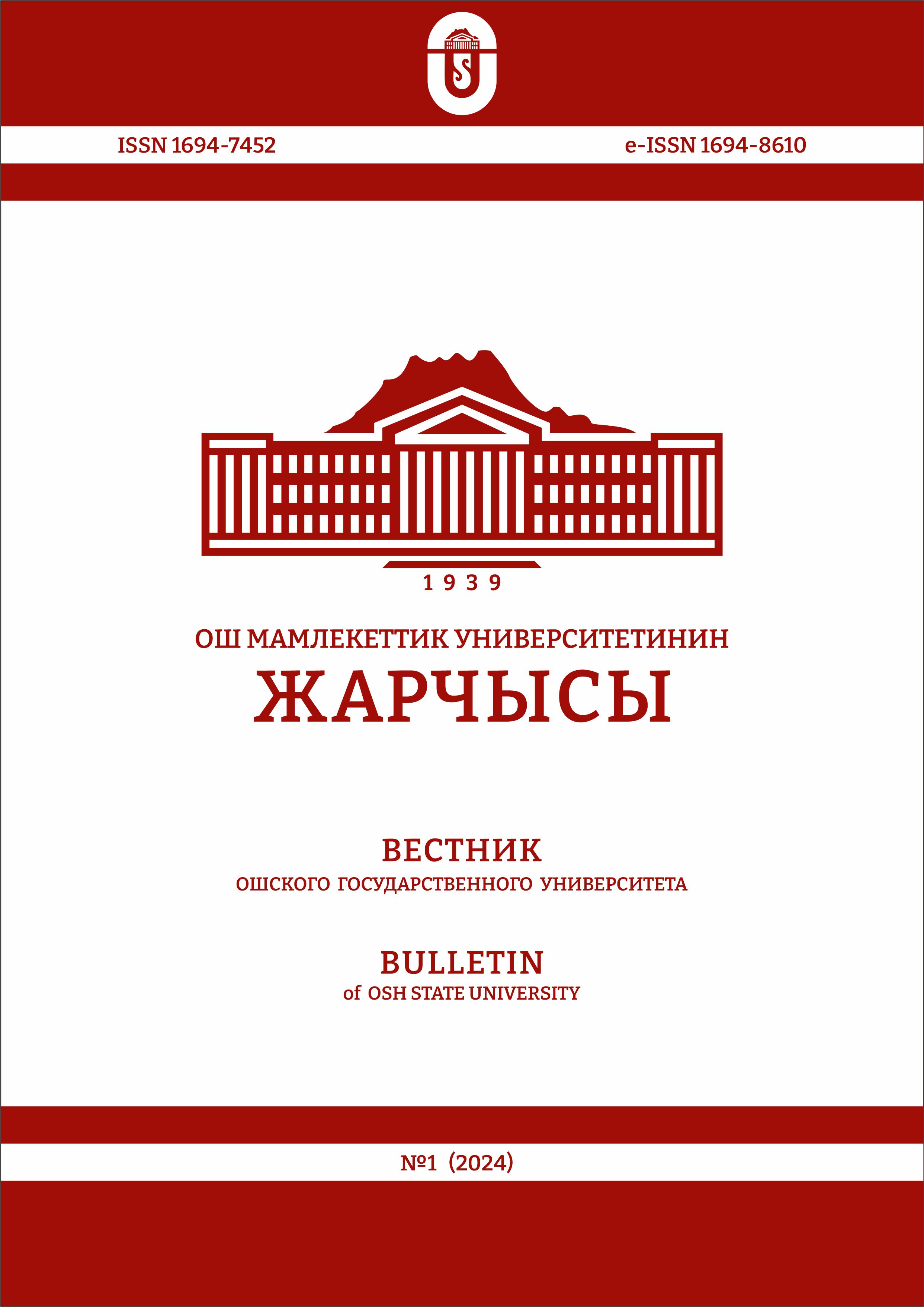THE POSSIBILITIES OF A TEACHING INTERNSHIP IN DEVELOPING ENGLISH LANGUAGE TEACHING SKILLS
DOI:
https://doi.org/10.52754/16948610_2024_1_12Keywords:
academic study, culture, English, internship, language, scholarsAbstract
This study is based on theoretical and practical aspects of an abroad internship and presents a qualitative (to observe scholars’ views on different university activities; informally interview scholars; open-ended questions about scholars’ adjustment experiences and social support from the host university) investigation. This study aims to explore the problems and challenges of an internship abroad and identify opportunities for learning at a host university. This investigation considers interpersonal challenges as academic issues (learning the university style, requirements, schedule, and structure); language (communication with native speakers in different social places and academic communities); and culture (living style, housing, expenses). This paper examines the experience of 11 scholars from different universities in Kazakhstan. The research was conducted through an online survey instrument Google Forms because it is commonly used in academic research in all Kazakhstan universities. There are 20 closed-ended questions with “yes”, “no' ' or other short reply to responses about their experiences during the internship.
References
Abdimomunova A.O. (2022). Bolochok chet tilchi mugalimin dajardoodo kalyptandyruuchu kompetentsijalar. Alatoo Academic Studies. Bishkek, №2, pp. 19-24. DOI: https://doi.org/10.17015/aas.2022.222.02
Allen, H. W., & Herron, C. (2003). A mixed-methodology investigation of the linguistic and affective outcomes of summer study abroad. Foreign Language Annals, 36, 370–385. DOI: https://doi.org/10.1111/j.1944-9720.2003.tb02120.x
Andrade, M. (2006). International students in English-speaking universities: Adjustment factors. Journal of Research in International Education, 5(2), 131-154. DOI: https://doi.org/10.1177/1475240906065589
Braun V, Clarke V. 2006. Using thematic analysis in psychology. Qual Res Psychol. 3(2):77–101. DOI: https://doi.org/10.1191/1478088706qp063oa
Chen, C. P. (1999). Common stressors among international college students: Research and counseling implications. Journal of College Counseling, 2, 49-65. DOI: https://doi.org/10.1002/j.2161-1882.1999.tb00142.x
Dewey, D. P. (2007). Reading comprehension and vocabulary development in orthographic complex languages during study abroad. In S. Wilkinson (Ed.), Insights from study abroad for language programs (pp. 72–83). AAUSC Issues in Language Program Direction. Boston: Heinle.
Freed, B. F., So, S., & Lazar, N. A. (2003). Language learning abroad: How do gains in written fluency compare with gains in oral fluency in French as a second language? ADFL Bulletin, 34, 34–40. DOI: https://doi.org/10.1632/adfl.34.3.34
Godfrey, L., Treacy, C., & Tarone, E. (2014). Change in French second language writing in study abroad and domestic contexts. Foreign Language Annals, 47(1), 48-65. DOI: https://doi.org/10.1111/flan.12072
Gudykunst, W. B. (1995). Anxiety uncertainty management (AUM) theory: Current status. In R. L. Wiseman (Ed.), Intercultural communication theory (pp. 8–58). Thousand Oaks, CA: Sage Publications.
Gudykunst, W. B. (1998). Applying anxiety/uncertainty management (AUM) theory to intercultural adjustment training. International Journal of Intercultural Relations, 22, 187–227. DOI: https://doi.org/10.1016/S0147-1767(98)00005-4
Hammer, M. (1992). Research mission statements and international students’ advisory offices. International Journal of Intercultural Relations, 16, 217–236. DOI: https://doi.org/10.1016/0147-1767(92)90019-Q
Haydam, N. E., & Steenkamp, P. (2020). A Methodological Blueprint for Social Sciences Research–The Social Sciences Research Methodology Framework. EIRP Proceedings, 15(1).
Haydam, N. E., Slabbert, A., & Uken, E.A. (2011). From Quantum Physics to Quantum Marketing Research Practice – A Monistic View. Proceedings of the 32nd SAMRA Conference. Southern African Marketing Research Association: Vanderbijlpark, 1 to 3 June, pp. 1-32
Imetova Zh.K. & Zhakaeva G.K. (2021). Zhozhdordogu tildik emes fakultetterde kesiptik anglis tilin okutuunun uchurdagy koygoyloru zhana any chechuunun ajrym zholdoru. Bulletin of Osh State UniversityVol. 4, No. 4. pp. 60-66. DOI: 10.52754/16947452_2021_4_4_60. EDN: FZBQRO. DOI: https://doi.org/10.52754/16947452_2021_4_4_60
Kinginger, C. (2008). Language learning in study abroad: Case histories of Americans in France. Modern Language Journal, 92. Supplement DOI: https://doi.org/10.1111/j.1540-4781.2008.00821.x
Kuo, Y. (2011). Language challenges faced by international graduate students in the United States. Journal of International Students, 1(2), 38-42. DOI: https://doi.org/10.32674/jis.v1i2.551
Laad, P. & Rudy J. (1999). „Learning style and adjustment issues of international students‟, Journal of Education for Business, 74, 6, 363-371 DOI: https://doi.org/10.1080/08832329909601712
Li, G., Chen, W., & Duanmu, J. (2010). Determinants of international students’ academic performance: A comparison between Chinese and other international students. Journal of Studies in International Education, 14(4), 389-405. DOI: https://doi.org/10.1177/1028315309331490
Mirzakmatova O. & Zheenbekova G.T. (2021). Novye tehnologii obuchenija anglijskomu jazyku. Bulletin of Osh State University. V. 4, №4. pp. 90-95. DOI: 10.52754/16947452_2021_4_4_90. EDN: GGOPVK. DOI: https://doi.org/10.52754/16947452_2021_4_4_90
Sandhu, D. & Asrabadi, B. (1994). Development of an accumulative stress scale for international students: Preliminary findings. Psychological Reports 75, 435–448 DOI: https://doi.org/10.2466/pr0.1994.75.1.435
Stronkhorst, R. 2005 Learning Outcomes of International Mobility at Two Dutch Institutions of Higher Education. Journal of Studies in International Education 9(4):292–315. DOI: https://doi.org/10.1177/1028315305280938
Toncar, M. F., & Cudmore, B. V. (2000). The overseas internship experience. Journal of Marketing Education, 22(1), 54-63. DOI: https://doi.org/10.1177/0273475300221007
Vandeveer, R., & Menefee, M. L. (2006). Study abroad, international internship and experiential learning: A world-class adventure in learning. In Decision Sciences Institute Southwest Region (SWDSI) 2006 Annual Conference (pp. 200-207).
Downloads
Published
How to Cite
Issue
Section
License
Copyright (c) 2024 Bulletin of Osh State University

This work is licensed under a Creative Commons Attribution-NonCommercial 4.0 International License.
Accepted 2024-03-28
Published 2024-03-27



